- Home
- Muriel Spark
Far Cry from Kensington Page 2
Far Cry from Kensington Read online
Page 2
I never got my last week’s wages. They owe me seven pounds, 1954 valuation. The noise in our general office might well have been due to an unconscious desire on our part to keep the devils away, after the practice of primitive tribes. The devils were to come in the end and Martin York was to go to prison for multiple forgeries and other types of fraud, but we employees, although we knew that the firm was rocky, did not as yet foresee quite so drastic a near future. We thought merely that we would soon have to find another job. In the meantime we got on with the jobs we had.
The shorthand-typist was called Ivy, a tall girl fresh from the secretarial college. Mary, the filing clerk, was a sixteen-year-old who had come straight from school. The packer and sorter was a young man called Patrick and I was, as usual, Mrs Hawkins, general do-all, proofreader, literary adviser and secretarial stand-in when the respective secretaries of Mr York and Mr Ullswater left to get married and were never replaced.
The Cypriot husband and his English wife in the house next door to Milly’s were having a row. It was two in the morning. They had started the rumpus in the garden but had gone indoors to continue it.
Now the first half-flight of Milly’s stairs led to a small landing with a window from which you could see straight through the opposite window into the next-door house, three feet away; if you sat on the second half-flight of Milly’s stairs you could see the exact equivalent of landing and half-flight next door.
I had been to bed but the fearfulness of the noise on this occasion had brought me down to Milly who was already up in her dressing-gown. The wife next door was screaming. Should we do something? Should we ring the police? We sat on the stairs and watched through the landing windows. Our stair-light was out but theirs was on. Apart from the empty piece of staircase we could see nothing as yet. The rest of our house was quiet, everybody asleep or simply ignoring the noise.
There had been a christening party that afternoon in the house next door. The row concerned the true paternity of the baby boy, some friend of the husband having raised the subject to him, in an aside, at the christening party. I do not think there was any real doubt in the husband’s mind that he was the father; only, it gave rationality to the couple’s mutual need to dispute, which had spilt rowdily over into the garden; the guests had all gone home.
Evidently, the baby slept through the pandemonium for all we could hear were the wife’s shouts and screams and the husband’s fury: noises off.
Suddenly they appeared on the stairs, the second half of their staircase, before our eyes, as on a stage. Milly, always with her sense of the appropriate, dashed down to her bedroom and reappeared with a near-full box of chocolates. We sat side by side, eating chocolates, and watching the show. So far, no blows, no fisticuffs; but much waving of arms and menacing. Then the husband seized his wife by the hair and dragged her up a few stairs, she meanwhile beating his body and caterwauling.
Eventually I phoned the police, for the fight was becoming more serious. A policeman arrived at our door within ten minutes. He seemed to take a less urgent view of the din going on in the next-door house and was reluctant to interfere. He joined us on the staircase from where we could now only see the couple’s feet as they wrestled. The policeman crowded beside us, for there was no convenient place for him to sit. My hips took up all the spare space. But finally our neighbours descended their staircase so that we could see them in full.
‘Can’t you stop them?’ said Milly, passing the chocolates.
The policeman accepted a chocolate. ‘Mustn’t come between husband and wife,’ he said. ‘Inadvisable. You get no thanks, and they both turn on you.’
We could see the force of this argument. Milly offered to make a cup of tea, which she was always ready to do. Finally the policeman said, ‘I’ll go and have a word with them. This time of night, disturbing the peace.’
We heard him ring their front door-bell; it was a long ring, and at the same time we saw the scene before us disintegrate. The wife and husband sprang apart, she tidying her hair, he pushing his shirt into his trousers. They disappeared from view. From the street came the sound of their front door opening, and the mild reproving voice of the policeman. The wife’s voice, thrown high and clear into the empty night, was pleading, apologetic, conciliatory. ‘We was just having a bit of an argument, officer.’
The light on the stairs opposite went out. End of the show. Milly and I had a cup of tea in the kitchen and discussed something else.
When I left the house for the office at nine the next morning, the smiling, nut-brown face of our Cypriot neighbour looked up at me from the job he was doing on one of the wheels of his car. ‘Good morning, Mrs Hawkins,’ he said.
How did he know my name? I didn’t know his. People always knew who I was before I knew them, in those days. Later, when I got thin I had to take my chance with everyone else; and this confirms my impression that a great large girl is definitely a somebody, whatever she loses by way of romantic encounters. ‘Good morning,’ I said.
Generally, I got to the office between half-past nine and quarter to ten in the morning. The clock in the big general office was unreliable, and because of a chronic lack of ready cash was likely to remain so. I think that if a clock is not punctual you can’t expect the people who live with it to be so. We were all fairly lax about time as the business more and more declined. Patrick, the packer and sorter, was most often the first to arrive, and it was he who would take the first phone calls. I don’t know if my memory exaggerates but, looking back, it seems to me that almost every morning I would find Patrick on the phone, shouting to cover his embarrassment and inability to cope with the caller’s problem. At that hour the caller was usually an author and the problem was money. Later in the morning, just before noon, the printers and binders would have their hour; their problem too was money, bills unpaid. And certainly, till the bills were paid, there was no hope of sending more books to press.
The telephone: ‘Would you mind calling back later? Mrs Hawkins isn’t in.’ That was Ivy, getting rid of someone. Again, the telephone: ‘Ullswater Press,’ says Ivy.
Hardly a morning passed but Mabel, the distraught wife of Patrick, would come in to visit him. She invariably turned on me with accusations that I was seducing her husband.
‘Mabel! Mabel!’ — Patrick was a tall young man with glasses and lanky fair hair, very like a curate in his precocious solemnity; a little younger than me. He was hoping to make a career in publishing; books and reading were his passion. It was true he was attached to me, for he felt he could confide in me. I would listen to him often during the lunch hour when, if it was too cold and rainy to go to the park, we would send out for sandwiches and eat them with our office-made coffee. I think he had married Mabel because she was pregnant. Now Patrick earned very little, but Mabel had a job, and their young child was looked after during the day by Mabel’s mother. Whether it was because Patrick was too engrossed in his books to pay attention to his wife or whether he had spoken approvingly of me to her, or whether it was both, Mabel had taken it into her head that I was enticing Patrick away from her. She was in a great state of nerves, and if we had not all tolerated these outbursts of accusation when she came into our office on her way to work, I think she would have been unable to go on to her job in the offices of a paint firm nearby. As it was, we always calmed her down and she would leave with backward looks of reproach at me on her small blade-like face. ‘Mrs Hawkins, you don’t know the harm you’re doing. Perhaps you don’t know,’ she said more than once.
‘Mabel! Mabel!’ said her husband.
Ivy the typist would batter on all through this scene. Cathy the book-keeper, her eyes bulging behind her thick lenses, would rise to her feet, wave her hands, and croak, ‘Mrs Hawkins is our editor-in-chief and innocent of the crime.’
Patrick was always mournful after his wife’s departure. ‘It’s good of you to take it like this, Mrs Hawkins,’ he would say sometimes, although all I had done was stand in my buxom bulk. And at other times he would say nothing, intensely studying the books he was packing so carefully, so expertly and rapidly.
One of our creditors, a small printer, had taken the difficulties of Ullswater Press so personally as to employ a man with a raincoat to stand in the lane outside our office windows all morning and afternoon, staring up. That’s all he did: stare up. This was supposed to put us to shame. In the coffee break we did a certain amount of staring back, standing in threes and fours at the window with our cups in our hands. It was strange to see the raincoated man: he was out of place in that smart, expensive area of London; indeed, he was supposed to be shabbily noticeable. In that part of South Kensington from where I emerged every morning from Monday to Friday, the man would have been merely that man-in-the-street that the politicians referred to: one of many. But here in the West End everyone looked at the man, then up at our windows, then back again at him.
At Milly’s in South Kensington, everybody paid their weekly rent, however much they had to scrape and budget, balancing the shillings and pence of those days against small fractions saved on groceries and electric light; at Milly’s, people added and subtracted, they did division and multiplication sums incessantly; and there was Kate with her good little boxes marked ‘bus-fares’, ‘gas’, ‘sundries’. Here, in the West End, the basic idea was upper-class, scornful of the bothersome creditors as if they were impeding a more expansive view. We, in the noisy general office, were not greatly concerned: after all, the responsibility was not ours, it was that of the Ullswater Press, of Mr Ullswater and of Martin York, and the other names who formed a board of directors; especially of Martin York who ran the firm. It was he who brought me manuscripts he had picked up from his fellow-officers of war-time, or former school friends. ‘Will this make a best-se
ller? Read it and tell me if it might be a best-seller. We need a few best-sellers.’ As for the proofs of books waiting to be published, these piled up on my desk, waiting their long turn. I worked on them meticulously; words, phrases, paragraphs, semi-colons. But they remained on my desk long after they were ready to be returned to the printers. New credit from printers and binders was difficult to get. ‘Mrs Hawkins, keep those authors away from me.’
Authors — they wanted to know why publication date was always being postponed. The phone would ring. Whereupon Ivy, in her highly affected drawing-room accent, would loudly reply above the auditory effects of our office, ‘Mrs Hawkins is in a meeting, I’m afraid. Can I take a message? No, I don’t know when she’ll be back. No I can’t disturb her, she’s in a meeting.’ I discovered, after enquiring, that it was an old tradition of the firm, started by Martin York, to say ’in’ a meeting, not’at’ a meeting. I supposed ’in’ sounded more immersed and not to be disturbed. Ivy had the knack of making ‘in a meeting’ sound indignant right from the start, as if the very idea of telephoning merely to ask for someone who was thus occupied was an outrage. Ivy had caught the Ullswater Press idea. The floor around Ivy’s desk was presently piled with papers, for Mary the filing-clerk left, complaining of the ‘atmosphere’ created by wild Mabel’s visits. Mary was not replaced.
It was after the tea-break that Martin York would usually call down on the intercom. ‘Can you spare a minute, Mrs Hawkins?’ A minute meant an hour, sometimes more. He wanted to talk, to confide. He would stand at his window looking down at the courtyard at the back of the house and talk. Or he would sit down and talk from the leather armchair opposite mine.
‘Sherry? Whisky?’ said Martin York.
I accepted a sherry only if he kept me talking after five-thirty, when it was my time to go home. I was used to keeping late office hours, especially now that the office staff was thinning out, and everyone had to take on the jobs of two or more people. In the days when Martin York kept me talking it was a sort of rest. When he spoke of the past, it was the war. When he spoke of the future, it was of the important loan he claimed to have raised to put the firm on its feet. His war exploits were true. As for the loan, I kept in mind a former remark of his: ‘If it is widely enough believed that you have money and wealth, Mrs Hawkins, it is the same as having it. The belief itself creates confidence. And confidence, business.’ His round face was pock-marked as if he had had smallpox. It was difficult to dislike him; this was not only my feeling but that of all his associates and friends. So that when he put it about from time to time that he had received important backing, if he was not believed, then everybody wanted to believe him, to the effect that he did indeed attract new funds from time to time, and temporarily save the situation.
It was when Martin York was especially upset that he would call me up to his office to talk to him. It made me sad to leave the galley-proofs of a novel by Cocteau or a new edition of Tender is the Night folded on my desk. Many of the Ullswater Press books were so good, so rare. I enjoyed keeping a sharp eye for typographical errors; I loved to check doubtful points of translations with the greatest care; no matter that the office was a turmoil of mixed sounds and that I was constantly interrupted to answer the telephone or settle some point of contention, I was always happy when checking proofs. ‘Evening Dispatch, Evening News’ would come the cry from the newsboy downstairs in the narrow lane; and the telephone would summon me to Mr York’s office. On these occasions he gave orders that he wasn’t to be disturbed by the telephone or by visitors.
When he was upset he drank whisky. I would talk to him while he sat back in his chair, eyes closed. I never talked about affairs in the office; I spoke of my home life at 14 Church End Villas, South Kensington. Mr York listened quite intently, as I discovered, for he always remembered some detail of the previous instalments.
‘How is Wanda getting on, Mrs Hawkins?’
Wanda, the Polish dressmaker, had enough problems to fill up the rest of the afternoon. Mr York filled his glass, and I him in about Wanda.
‘Wanda’, I said, ‘suffers greatly.’
‘I never met a Pole who doesn’t.’
‘Most of her sufferings derive from her past sufferings. But now she has a new source. It isn’t a joke, Mr York. Wanda has a hard life. She has had an anonymous letter.’
Wanda made all my clothes for me. The only other place I could get clothes to fit me at a reasonable price was an Outsize Shop in Oxford Street: these were clothes suitable for everyone, only larger. Wanda, on the other hand, had a flair for divining her clients’ personalities. Since she charged me very little, I had to take my chance for an occasional fitting when she wasn’t occupied with more profitable clients. This chance often occurred on a Sunday afternoon after five o’clock. Wanda had been to the one-o’clock Polish mass at Brompton Oratory and there, after the service, had met all her friends and relations who were then living in London. Counting the elderly and the children there must have been at least a hundred Polish refugees acquainted with or connected with Wanda. I knew this at first hand because I had accompanied Wanda on a few occasions to the one-o’clock Polish mass and national gathering. The Oratory was always crowded. A large number of husbands and fathers were gathered outside the church for the entire service, only turning towards the church doors to sign themselves with the cross at the moment when the bell announced the Elevation.
Wanda was a short plump woman in her late forties. In my memory, it is always winter when Wanda comes to mind on her social occasions outside Brompton Oratory after the Mass. The heavy incense of those days hovered around the doors of the church as the people emerged. Wanda had a thick, shapeless, bristling fur coat of a dark colour, with a fur hat to match. Her pale blonde hair protruded at the back in a thick plaited bun. She had a sweet oval face with small blue eyes. As she talked to her special group of compatriots she would rhythmically bob her whole body forward in emphasis of her words, to the effect that with every bob forward her behind would bob backward as if likewise to emphasize its declarations. The gatherings outside the Oratory which spilled over into Brompton Road would gradually disperse, so gradually that it was not till three in the afternoon that the voluble exiles had moved off, some to visit a nearby museum, the Victoria & Albert or the Natural History, most to crowd into the tea shops where they ate sweet cakes and creamy pastries with tea and lemori. They greatly enriched London with their new and alien life.
As I discovered from Wanda, a good part of the afternoon’s conversation consisted in exchanges of émigré survival-lore and items of information about the practical aspects of the country they had come to settle in. Like other groups of war refugees, they brought their courage with them; it was no mean offering. In exchange they visibly and loquaciously went about to discover what funds were available and where. What ministry to apply to? What forms to fill in? What schools, what doctors? — And, for the Poles, what Catholic schools and doctors? — What organizations, what committees, bursaries, scholarships, what personages, what names, addresses and telephone numbers, and what jobs and what employment agencies? They knew the public libraries, the specialized private libraries and the best reading-rooms. Wanda and her friends certainly knew far more about how to tap the resources of post-war Britain than I did. And it was not all a materialistic process. Some of Wanda’s friends were ardent lecture-goers. Word went round about the lectures given in the evenings in London. Someone was always giving a lecture on politics or astronomy, history, Czech poetry, Polish literature, the customs of the Polynesians. I had no idea, until I heard about it from Wanda, that there was so much lecturing going on in London.
In those days of pounds, shillings and pence, Wanda managed on very few of them; her charges for alterations were mostly computed in shillings. Alterations of clothes took up a great many of her working hours; only occasionally did she have to devote her days to an important job — the making of a wedding dress, a coat for the bridegroom’s mother or a new summer dress for one of her ladies.

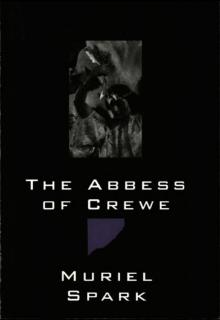 The Abbess of Crewe: A Modern Morality Tale
The Abbess of Crewe: A Modern Morality Tale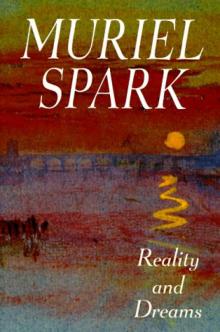 Reality and Dreams
Reality and Dreams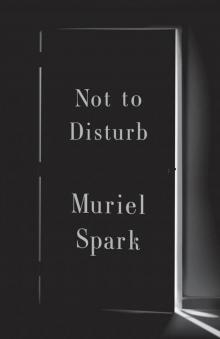 Not to Disturb
Not to Disturb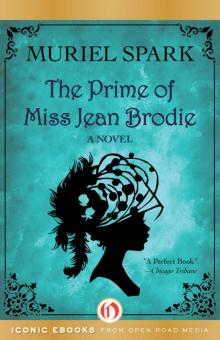 The Prime of Miss Jean Brodie
The Prime of Miss Jean Brodie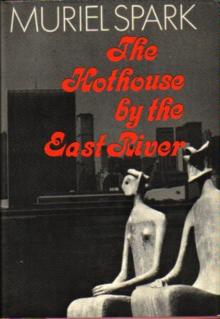 The Hothouse by the East River
The Hothouse by the East River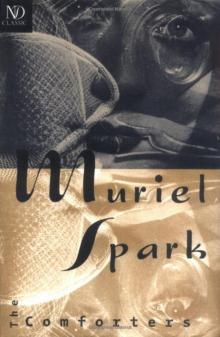 The Comforters
The Comforters (1958) Robinson
(1958) Robinson Unknown
Unknown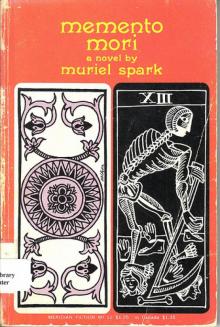 Memento Mori
Memento Mori The Finishing School
The Finishing School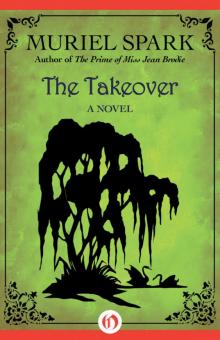 The Takeover
The Takeover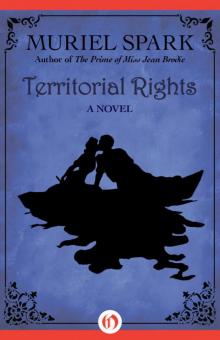 Territorial Rights
Territorial Rights The Complete Short Stories
The Complete Short Stories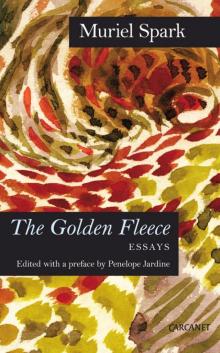 The Golden Fleece: Essays
The Golden Fleece: Essays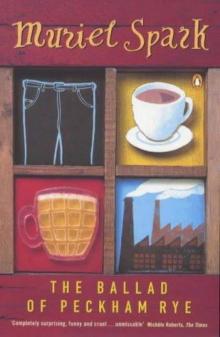 The Ballad of Peckham Rye
The Ballad of Peckham Rye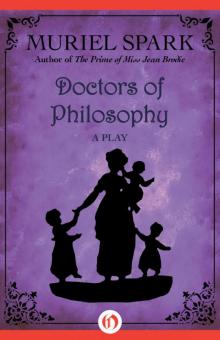 Doctors of Philosophy: A Play
Doctors of Philosophy: A Play The Mandelbaum Gate
The Mandelbaum Gate Loitering With Intent
Loitering With Intent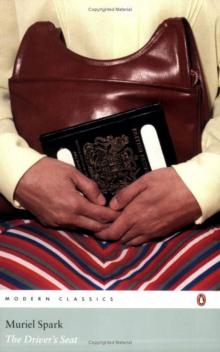 The Driver's Seat
The Driver's Seat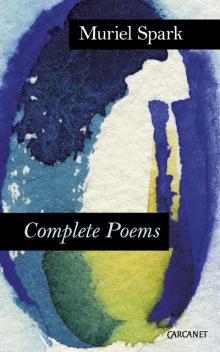 Complete Poems: Muriel Spark
Complete Poems: Muriel Spark Symposium
Symposium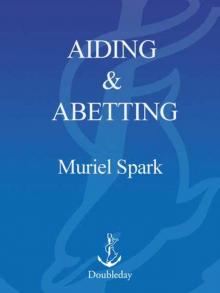 Aiding and Abetting
Aiding and Abetting The Golden Fleece
The Golden Fleece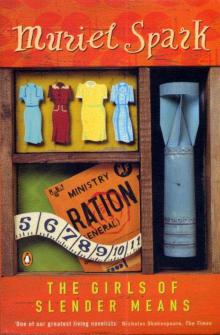 The Girls of Slender Means
The Girls of Slender Means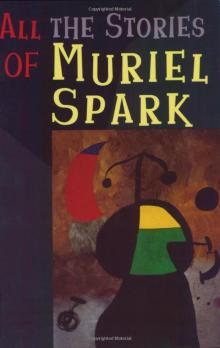 Alice Long’s Dachshunds
Alice Long’s Dachshunds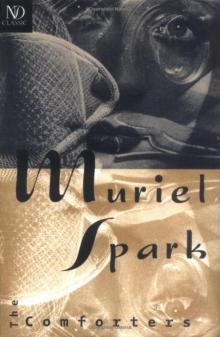 (1954) The Comforters
(1954) The Comforters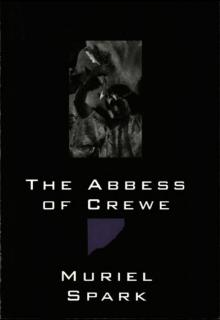 The Abbess of Crewe
The Abbess of Crewe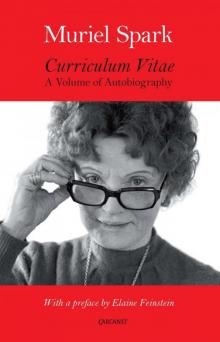 Curriculum Vitae
Curriculum Vitae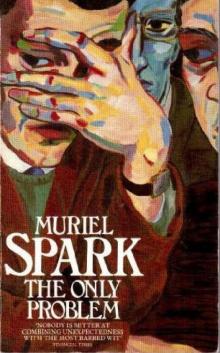 The Only Problem
The Only Problem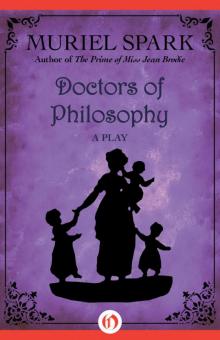 Doctors of Philosophy
Doctors of Philosophy